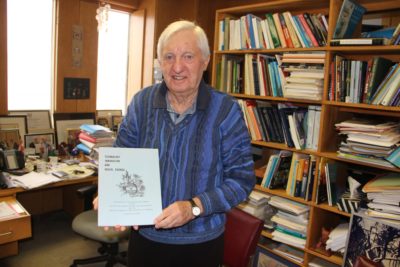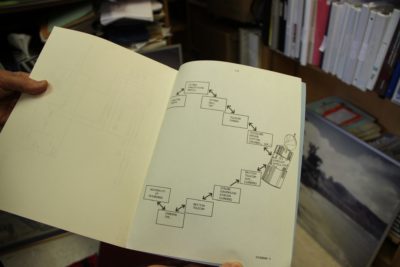Technology, Innovation and Social Change in 1984
Three decades later, Fraser Taylor reminisces about a groundbreaking conference held simultaneously at CU and the University of Edinburgh.

Professor Fraser Taylor proudly shows off the 1984 proceedings booklet from Technology Innovation and Social Change (2015)
In December of 1984, an International Seminar on Technology Innovation and Social Change was held between a budding 40-year-old Carleton University and the fully bloomed University of Edinburgh, which had at the time just celebrated its 400th anniversary. The Seminar was organized by celebrated member of the CU community, Distinguished Research Professor and Director of the Geomatics and Cartographic Research Centre, Fellow of the Royal Society of Canada and 2014 Killam Award winner, Fraser Taylor.
As a graduate of the University of Edinburgh, Taylor was excited with the prospect of working with his alma mater; and knowing that both universities had Canadian Studies programs, he saw this as a terrific opportunity to forge an alliance between the two institutions. Taylor spearheaded the initiative, and uninspiringly, an agreement was quickly reached. Accordingly, Taylor acted as Chair of the organizing committee, which also involved many people at Carleton as well as funders from Government and Industry.
Taylor recently stumbled on these three-decade-old Seminar proceedings while going through his records, and was flooded with positive memories. He could hardly believe how “modern” nearly 30-year-old observations could be.
Titled “Technology Innovation and Social Change,” the 1984 seminar was in many ways, quite ahead of its time. Much like today, in the 80’s there existed a longing to acquire a better understanding of the effect of technology on social change in a media-scape that was changing quickly.
“We were using new technology to discuss the impact of such technologies,” reminisced Taylor. “We pioneered what is now a common form of international communication, and to my knowledge this was the first time this had ever been done between two universities on different continents!”
Considering today’s omnipresence of ‘borderless’ intercontinental institutional collaboration, the trailblazing spirit of this partnership cannot be overlooked. The Seminar was held simultaneously in Ottawa and Edinburgh in late October of 1984, and featured keynote speakers from Academia, Industry and Government from both sides of the Atlantic. Astoundingly, it even included a joint session with the two locations linked by satellite videoconference.

The international communication plan from the 1984 Seminar. (2015)
Further to all of this, Taylor and his colleagues broadcast all Carleton aspects of the Seminar site through Ottawa Cablevision, allowing thousands of viewers to watch some of all-time leading experts in the field – including a talk by globally renowned physicist, Dr. Ursula Franklin – on what was then a Carleton distance education channel. The proceedings included a technical description of how the group set up the Senate chambers and also how the technology was used in the satellite transmission. “All went off without a technical hitch!” recalls a proud Taylor.
This groundbreaking seminar had a number of terrific outcomes. “The main long term impact for Carleton was the opportunity for one Carleton student to study at Edinburgh each academic year,” explains Taylor. “I also established a scholarship fund with donations from Edinburgh alumni in Canada to help meet the costs of both the Carleton student going to Edinburgh and the Edinburgh student coming to Carleton. Further to this, we founded new research contacts with various faculties and departments in both institutions including Canadian Studies.”
For Taylor, the word that best sums up 1984’s Technology Innovation and Social Change Seminar is ‘innovation.’ “Carleton was, and still is, at the forefront of this important topic and many of the observations in the proceedings are just as fresh now as they were then.”
Taylor hopes that this three-decade-old story can help inspire Carleton as it continues to take steps towards strengthening its reputation as a leader in international endeavours.
The post Technology, Innovation and Social Change in 1984 appeared first on Faculty of Arts and Social Sciences.